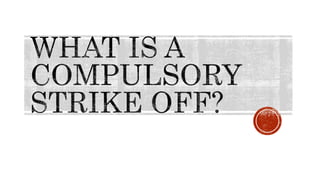Key Steps in the Compulsory Strike Off Refine
Wiki Article
Abiding By Regulatory Commitments: Key Factors for Compulsory Strike off Execution
Browsing the landscape of regulatory responsibilities can be a complicated undertaking for organizations. When it involves the implementation of mandatory strike off procedures, ensuring compliance with the necessary needs is vital. From thorough documents techniques to aggressive communication with governing authorities, there are key factors that organizations have to think about to navigate this procedure effectively. By comprehending the subtleties of governing compliance and the ramifications of non-compliance, companies can protect their procedures and credibility.

Regulatory Compliance Assessment
When performing a governing compliance analysis, it is vital to systematically assess and evaluate all pertinent laws, policies, and standards that pertain to the certain sector or procedure concerned. By extensively checking out the legal framework, organizations can make certain that they recognize their responsibilities and are furnished to maintain the necessary requirements established forth by governing bodies.Throughout the assessment process, it is important to identify any kind of spaces in between present techniques and regulatory demands. This gap evaluation enables companies to identify locations of non-compliance and take rehabilitative actions to mitigate threats. first gazette notice for compulsory strike-off. Conducting an extensive review enables business to establish interior controls and procedures that line up with regulative assumptions.
Moreover, a governing conformity analysis serves as a proactive procedure to stop potential infractions that could lead to pricey charges or reputational damage. By remaining abreast of governing adjustments and continuously evaluating their conformity condition, companies can cultivate a culture of adherence to ethical criteria and lawful demands. Eventually, a complete governing compliance evaluation is foundational in promoting functional stability and sustainability.
Documents and Record-Keeping
Making certain thorough paperwork and specific record-keeping methods is a cornerstone of regulatory compliance in any industry. Appropriate documents not just help in fulfilling lawful needs yet additionally functions as an important device for inner monitoring and decision-making procedures. Organizations should establish durable systems for documenting crucial activities, purchases, and choices to ensure openness and accountability.Maintaining accurate records is important for showing conformity during regulatory audits or examinations. Records must be arranged, quickly available, and preserved for the needed duration as per regulatory standards. Applying a centralized electronic record management system can simplify record-keeping processes, improve information protection, and alleviate the risk of info loss or meddling.
Normal audits of paperwork methods are critical to determine spaces or variances that can result in conformity issues. Educating staff members on appropriate record-keeping procedures and data security measures is also critical to promote governing requirements. By focusing on careful paperwork and record-keeping, companies can proactively minimize compliance threats and foster a culture of responsibility and integrity within the firm.
Timely Entry of News
Proper documents and record-keeping practices lay the foundation for regulatory compliance; in a similar way, timely entry of records is paramount in showing adherence to developed procedures and satisfying reporting responsibilities. Timely submission of reports ensures that regulative bodies obtain current and exact information about the entity's procedures, financial status, and compliance with pertinent laws and guidelines.Failure to send reports on schedule can cause charges, fines, or various other enforcement activities. It can likewise increase uncertainties concerning the entity's overall compliance society and administration methods. To facilitate prompt entries, companies need to establish clear reporting timelines, allot sufficient resources for record prep work, and execute durable interior controls to make sure and keep an eye on due dates accuracy.
Furthermore, timely entry of reports enhances openness and liability, cultivating count on with stakeholders, including financiers, regulators, and the general public. It signifies a dedication to good governance methods and regulatory compliance, which can positively influence the entity's reputation and trustworthiness in the marketplace. By prioritizing the prompt entry of reports, companies show their commitment to running with stability and according to applicable legislations and regulations.
Financial Transparency and Responsibility
Demonstrating monetary transparency and liability is important for fostering depend on and trustworthiness within an organization's stakeholder neighborhood. what is compulsory strike off. By providing clear and precise financial info, business can display their commitment to ethical methods and sound governance. Transparency in financial coverage allows stakeholders to analyze the organization's performance, make notified choices, and hold administration responsible for their activitiesTo ensure monetary openness, firms need to comply with accounting criteria and laws, properly record economic deals, and disclose info in a prompt way. Normal audits by independent third events can further verify the precision and reliability of financial declarations. Furthermore, applying inner controls and segregation of tasks can aid avoid fraudulence and mistakes, enhancing overall liability.
Efficient communication of economic information with yearly reports, investor presentations, and stakeholder conferences is important for first gazette notice for compulsory strike off maintaining transparency. Companies ought to involve with stakeholders, address problems, and react to inquiries immediately to develop trust and reinforce relationships. Ultimately, a dedication to financial openness and accountability not only meets regulatory requirements yet also boosts the organization's credibility and sustainability.
Interaction With Regulatory Authorities

In addition, aggressive interaction can assist resolve prospective compliance worries prior to they rise, thereby protecting against more substantial regulatory issues in the future. Routine discussion with regulative authorities additionally permits organizations to stay informed concerning any kind of adjustments in laws or coverage demands, allowing them to adapt their methods appropriately. By preserving open lines of interaction and immediately dealing with any kind of questions or requests from regulatory authorities, organizations can navigate the regulative landscape much more efficiently and promote their dedication to conformity and liability.

Final Thought
In final thought, making certain conformity with regulatory obligations is necessary for the effective implementation of compulsory strike off measures. By performing routine evaluations, preserving extensive documentation, submitting records immediately, exercising economic transparency, and communicating properly with governing authorities, companies can reduce the danger of dealing with penalties or being struck off. It is important for entities to support their obligations and abide by governing requirements to prevent any kind of negative repercussions.Making certain careful documentation and specific record-keeping practices is a foundation of regulative conformity in any industry.Amidst the imperative of preserving economic openness and liability, effective communication with regulatory authorities stands as a critical element in promoting organizational conformity and integrity. Timely and clear interaction with regulatory bodies fosters depend on and shows a dedication to regulative conformity, which is crucial for the smooth operation of any type of organization. Giving complete and precise info makes sure that regulatory bodies have a detailed understanding of the organization's activities and can make educated choices regarding compliance problems.
By preserving open lines of communication and quickly addressing any queries or demands from regulative authorities, organizations can navigate the regulative landscape much more properly and maintain their dedication to conformity and accountability.
Report this wiki page